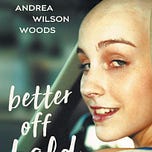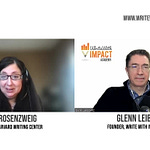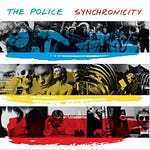(Hi, Glenn Leibowitz here. If you’re not quite ready to become a paying subscriber to Write With Impact Academy, I welcome tips via PayPal right here. Thank you for supporting my work!)
I had the privilege of speaking to Andrea Wilson Woods recently about her bestselling medical memoir, "Better Off Bald: A Life in 147 Days." It's the story of how she raised her younger sister Adrienne from the age of eight until she died from liver cancer at the age of 15.
It's a beautiful story, and one with a universal message not only for caretakers, like what she was at the time for her sister, but for everyone. It makes you stop and think deeply about the wonder of the gift we call life.
It's heart-wrenching, yes, but also incredibly inspirational and even humorous. The book made me cry, but it also made me laugh. By the last page, I felt I knew her sister, and I admired her. The depiction of her passing was especially heart wrenching.
In our conversation for Write With Impact Academy, Andrea covers a lot of ground that should be of interest to writers who are writing a memoir (or thinking of writing one), from her use of the present tense to take you back into time as if you were watching the events unfold, to her focus on discrete periods of time (thus the sub-title of the book), to her honest depiction of the people who play a role in her story, including family members, some of whom have shunned her since the book was published.
Andrea also shares several of the strategies she used to market her book, from soliciting expert endorsements, to recruiting her Amazon review crew, to leveraging promotions on Good Reads and other platforms, to using weekly LinkedIn Live video sessions.
There’s so much packed in here that I think you’ll find actionable and inspiring. Listen to the podcast version at the top of this post, or on Apple Podcasts.
To watch a complete video of our conversation, jump to the bottom of this post.
Here are several short video excerpts from our conversation that are organized into two sections: writing your memoir and marketing your book.
(Consider becoming a paying subscriber for the full content here at Write With Impact Academy. We’re offering a 14-day free trial)
WRITING YOUR MEMOIR
Show Don’t Tell
I think it’s really important that you show and don’t tell. So, don’t tell me that you’re angry, show me what does anger look like. How does it feel? And that’s how you really hook people in, if they’re going through the experience with you.
Sometimes writers try too hard to tell readers what to feel, much like movies when they put too much music in and they’re telling us with the music exactly what to feel at exactly the right time.
You have to trust your readers a bit more, and show them and trust them to infer whatever meaning that you’re trying to convey. And maybe they’ll get a different meaning out of it and that’s okay.
There’s a joke in my book that my sister made, and most people thought it was funny, a lot of people thought it was horrible. That’s okay.
I showed, and didn’t tell. With memoir, you have to be honest.
Write in Present Tense
The story is told in present tense. That was on purpose, though that doesn’t always work. But I felt like it was really critical if people were going to feel the experience, that the actual 147 days should be told in present tense, I used flashbacks throughout the book that were clearly in past tense that talk about that time leading up to that diagnosis.
Be Prepared for Blowback from Family and Friends
One of the biggest things I see from people who are writing memoir or thinking about it, is they are so worried about what people will think, because you’re writing about real people. I just say, you know what, you better be prepared to upset the people in your life. You have to be prepared for that. And you have to make decisions about characters.
Even if you change someone’s name, which I do, or create composite characters, which I actually don’t, you have to realize people will recognize themselves, and you have to be prepared for that blowback from family and friends. I knew in my book there was a particular part about my mother’s family that, if they ever read my book, they would be upset about.
I don’t think they ever read it, but I do think someone told them, and it’s about this one line. I did feel like it truly belonged in the book, that’s why I didn’t take it out, but when they heard about it they were hurt and upset and I haven’t seen them for two years. You have to be prepared for that if you’re going to write memoir.
Reliving the Pain
To write this memoir the way I wanted to write it, I did have to relive it with the first draft. After I got past the first draft, it was much better. The first draft took me two years, and I had a therapist during that time specifically for this purpose. Every day I worked on the book it was painful, and I usually worked on it six days a week.
It’s just like this wound that just starts to heal and you’re going to rip off the scab again. It was a very difficult time, it really was. And once I got the first draft done, I didn’t look at it for months, because I needed a breather from it. It was really really difficult.
I work in my sister’s point of view. All of that writing, including going back and reading things that she had written in her journal—I didn’t read her journal until after she died—just that exercise in itself, spending a whole day reading her journal, was very emotional for me. She was a great writer.
Writing in Her Room
One thing that was really special about writing my book is, I wrote that book in the room where my sister died, in her bedroom, and it felt really good. Whenever I worked on the book I worked in her room.
MARKETING YOUR BOOK
Hire a Team
I think that it’s really important that you hire a team, especially if you don’t have a mainstream publisher. Don’t do it alone. There were a lot of parts, logistical issues about publishing my book that I’m sure I could have figured out, and I had zero desire, because that wasn’t the best use of my time. I think that’s really important too, that if you are someone who is very entrepreneurial, and you like figuring things out, solving problems, you tend to want to do everything. I really encourage people to hire a team, don’t do it by yourself.
A great example is the cover of your book. I know too many authors who have designed their book covers, and they’re not designers, they’re writers. I didn’t design my book cover, part of my team did that. I took that photo where the cover came from, but I didn’t design it. And of course it wasn’t perfect the first time, we went through many iterations of it.
It’s really important to let other people do that sort of lifting for you so you can stay focused on getting out there and selling your book. So, I would say number one, hire a team.
Recruit Your Review Crew
You need to recruit people to be your review crew. This was something that the agency I hired didn’t do, I did it entirely on my own.
I reached out to my network and said, “Are you willing to review my work, you’ll get it early, but you’ll get about six weeks, and then you have to post that review as soon as the book goes live on Amazon,” because that makes a huge difference in the algorithm. I recruited about 30 people and about half of them left a review. That’s another piece of advice that I give: Find twice as many people as you think you’re going to need, because I was kind of surprised by the people who didn’t leave a review.
It affects the algorithm, it’s really important. And bless one of my best friends in San Francisco because he posted his review at 12:01 am! A lot of people did, they got their reviews up very quickly. My book was number one in three categories that first week or so, and it’s because those reviews were already there. It’s very critical. Don’t get attached to the actual review itself, you might not like it!
You provide an advance copy of the book. This is past the endorsement stage, the endorsements are in the book, and now you have the book in hands, but it’s not live yet on Amazon. You send it to these people who signed up to read it and review it as soon as it goes live. I sent a read it I sent a PDF to all these people giving them basic instructions. If you do give a book away, or a person is reading the book and didn’t pay for it, they do need to say they received an advance copy. And they do need to disclose any personal relationship, and so I had a few relatives who were very good about that, who stated what their relationship was, and they were giving a fair and honest review.
And you’ve got to stay on top of it, too. I probably sent an email every month to anyone who had ever gotten my book, and I asked them for a review. And the minute you give me a review you get off that list. So I’ll keep emailing you every month. I’ll change it up a little bit, but the whole gist of the email is, “Have you left your review yet? Have you done it?” And even in the book itself, in the bio section, I ask, “If you liked my book, please leave a review.” Really really critical.
Get Serious About LinkedIn
I’ve always had a presence on LinkedIn because I like the platform, but I really didn’t get really serious about LinkedIn until a year and a half ago, maybe two years ago. I saw how well video was doing on LinkedIn, and I wanted to try that and see. And so, I worked with a coach, I made a very concentrated effort for a long time, to put out 1-2 videos a week. And they were very short, they were 1-2 minute videos, they were edited. I mostly talked about healthcare, writing, but occasionally I would go totally off topic and do something personal.
I started testing different types of content. I liked testing does a photo post do better, or text, or those videos. And then I got approved for LinkedIn Live recently. It took me six times to get approved for LinkedIn Live; you just have to be persistent.
And so my goal with LinkedIn Live is do a LinkedIn Live every week at the same time. Ideally I really like interviewing people, but the (solo episode I did about marketing my book) actually did do really well.
When it’s live on LinkedIn, I also make sure to stream it to other platforms. So usually it’s streaming to YouTube, and it’s streaming to Facebook.
Go Out There and Hustle!
No matter who your publisher is, who represents you, at the end of the day, if you want your book to sell, it’s your job as the author to sell your book. It really truly is. You know your book better than anyone else, first of all. And it’s really your job to go out there and hustle.
I’m always shocked when writers publish a book, whether they do it themselves or have a small publisher, even a big publisher, and they expect that because it’s out there on Amazon that it’s just going to sell itself. And that’s just not the way the world works, that’s not reality. I think it’s really important as an author that you really really know and learn how to market your book.
(Consider becoming a paying subscriber for the full content and benefits at Write With Impact Academy. We’re offering a 14-day free trial)















Share this post